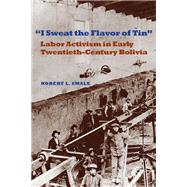
Robert L. Smale is assistant professor of history at the University of Missouri–Columbia.
| Acknowledgments | p. ix |
| Prologue | p. 1 |
| Laboring in the Boss's Shadow | p. 7 |
| Artisan Initiative | p. 38 |
| Crisis and Organization | p. 61 |
| Strikes and Contracts | p. 82 |
| The Uncía Massacre, 1923 | p. 110 |
| The Vicissitudes of Republican Rule | p. 144 |
| An Ideology of Their Own | p. 166 |
| Epilogue: The Chaco War and Its Aftermath | p. 193 |
| Notes | p. 201 |
| Bibliography | p. 229 |
| Index | p. 235 |
| Table of Contents provided by Ingram. All Rights Reserved. |
The New copy of this book will include any supplemental materials advertised. Please check the title of the book to determine if it should include any access cards, study guides, lab manuals, CDs, etc.
The Used, Rental and eBook copies of this book are not guaranteed to include any supplemental materials. Typically, only the book itself is included. This is true even if the title states it includes any access cards, study guides, lab manuals, CDs, etc.